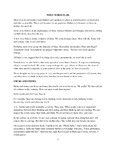- DSpace Home
- →
- CSUN ScholarWorks
- →
- CSUN University Archives
- →
- UAC 02.0 Academic Affairs
- →
- UAC 2.1 Office of the Provost and Vice President
- →
- UAC 2.1x Office of the Provost and Vice President - papers and documents
JavaScript is disabled for your browser. Some features of this site may not work without it.
| dc.contributor.author | Hellenbrand, Harold | en |
| dc.date.accessioned | 2014-09-09T19:17:06Z | en |
| dc.date.available | 2014-09-09T19:17:06Z | en |
| dc.date.issued | 2014-02 | en |
| dc.identifier.uri | http://hdl.handle.net/10211.3/126113 | en |
| dc.description.abstract | Most of us in universities want thinkers and speakers to enjoy as much freedom, as much give and take, as possible. This is not because we are generous. Rather, it is because we have an instinct for survival. Some of us believe in the marketplace of ideas. Justices Holmes and Douglas affirmed so, riffing on Mill. Keen ideas best the rest. A few of us believe in the evolution of ideas. We nourish many ideas. Most will die. Some will find a niche. One or two will thrive. Probably, most of us accept the dialectic of ideas. Remember my hoodies, Plato and Hegel? Arguments clash. Assumptions are purged. Opposites merge. Theories with more queries emerge. All three views suggest that if we barge in to select prematurely, we won’t do as well. Nonetheless, we also believe that some speech is worse than offensive. It imposes a deadening silence, except for itself. We want to stop such speech—yes, silence it. However, the view of what such speech is depends on your point of view or the point of view of you role. These thoughts are from my point of view, not the provost’s, not the president’s. Of course, they can affect how we think in those roles, but they do not dictate to those roles. | en |
| dc.format | application/pdf | en |
| dc.format.extent | 10 pages | en |
| dc.language.iso | en_US | en |
| dc.publisher | California State University, Northridge | en |
| dc.subject | Academic freedom. | en |
| dc.subject | Academia | en |
| dc.subject | California State University | en |
| dc.title | When Words Fail | en |
| dc.type | Article | en |
Files in this item
This item appears in the following Collection(s)
-
UAC 2.1x Office of the Provost and Vice President - papers and documents [39]
Collection for housing California State University Northridge archival documents of CSUN Office of the Provost and Vice President


